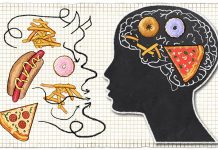These behaviors and activities are proven to help keep your brain young.
Keep learning new things
Learning new information and skills throughout your entire life helps to keep your brain strong even in the later years of life. Activities that have the highest value for brain health are those that are novel and complex to each particular person. What is easy for one person may be challenging for another, so the things that challenge you the most have the most value for your brain.
It is the novel and complex that will challenge the brain, stimulate learning, and promote synaptic density, decreasing the likelihood that neurodegenerative disease will manifest. With practice of an activity or skill, your synaptic density increases, and what was once novel and complex can easily become rote and passive. Therefore, continually learning new things will ensure your brain is always expanding and staying sharp!
If you need inspiration, try this mental stimulation exercise. This activity is designed to help you understand what is personally novel and complex for you, versus what is rote and passive.
- Take out a sheet of paper, and divide the paper in half.
- In the left column, list five activities that you enjoy and have fun with, and do most frequently. This list represents activities that are rote and passive. Your mind is already comfortable with these activities, which lessens the benefit they have on your brain.
- In the right column, list five activities that you find complicated, and don’t engage in frequently. This list represents activities your brain has not yet formed strong neural connections with; they are the complex and novel. These activities will likely benefit the development of new connections in your brain. Here are some more brain-boosting exercises to try.
Exercise regularly

Exercise has the positive effect of enhancing successful aging. Exercise performed on a routine basis may not only reduce the risk of neurodegenerative disease, but also may help to slow the course of an existing disease, such as Alzheimer’s.
Exercise can improve our energy levels, sense of well-being, sleep, and brain health. Engaging in regular exercise also reduces the risk of depression and anxiety. Identifying why we do not exercise permits us to systematically break down our barriers, and to slowly change our behaviors towards a healthy lifestyle. Learn more about why exercise is great for your brain.
Socialize and have fun!

Friends provide opportunities to enable the sharing of experiences, new learning, challenges, emotions, trust, and understanding. Friendship also provides the necessary motivation towards activity and involvement. Engaging in new pursuits with friends often helps develop new life roles, which provide us with an opportunity to feel appreciated, enjoy life, laugh, and have fun. Parent-teacher organizations, church, sports teams, and other groups and organizations are great places to develop relationships with other people. Here’s more advice on how to make friends as an adult.
Be health conscious

It is important for us to take control of our health and understand that we are in charge of managing of our bodies. Physicians work for us, and when it comes to our bodies we are the boss. Once we establish our own role in the management of our health, the importance of a close and trusting relationship with our physician becomes apparent.
Open communication can help the physician make sound decisions regarding our health. A team approach can help establish a united front against illness, and more importantly, promote our health. To keep yourself at your healthiest, maintain regular physical examinations, and follow your physician’s advice.
Slow down and appreciate the silence

Our society is evolving at an increasing rate, leaving us with little time to relax and process our environment. Our brains require time to process information more deeply, in order to gain more benefit from our daily experiences. A fast-paced lifestyle can cause chronic stress and have other negative effects on our health and well being. Reducing demands we place on ourselves is an important step towards stress reduction, and a more fulfilling life.
A new field of study referred to as neurotheology has been advancing the study of the neurophysiological correlation between prayer and subjective experience. Multiple studies have shown a relationship between spirituality and the immune system. As we continually learn more about the potential of positive thoughts to influence health, people are beginning to integrate these practices more frequently into their daily lives, and experiencing life-changing results. Meet the athletes proving that age is just a number.
Do not retire from life

Maintaining a strong sense of purpose in life is an important contributor to longevity. Making a conscious decision to stay actively involved in your daily routine is beneficial to your lifelong health and well being. Positive attitude has been shown to play a significant role in success, as well as your ability to recover from illness.
It is important to develop multiple skills and interests over your lifespan, as we have the ability to learn and develop new talents continually over time. It is our responsibility to nurture different roles and develop personal meaning and life purpose. Work can also be a necessary activity to help us find more meaning in our lives. Matching our passions in life with an occupation is powerful, and can promote our talents and potential in significant ways. Want to look and feel younger right now? Here’s how.
Reduce and eliminate smoking, drinking, and other drugs

Mood-altering substances, such as drugs and cigarettes, can decrease our functioning, lower our motivation, and impair our cognitive processes. They alter our emotions, which impairs our thinking by reducing focus, attention, memory, and our ability to execute plans.
Smoking is one of the leading causes of over a dozen cancers, including lung, oral, stomach, and liver cancer. Not to mention it stains our fingers, teeth and hair, and leaves us with foul-smelling breath! Here are our 23 best ways to quit smoking.
Set financial goals

A well developed plan for financial security is a great way to stimulate your executive functions (responsible for complex activity like organization, scheduling, impulse control, and more). Keeping track of your expenses; being aware of where your money is going helps you feel more in control of your financial situation. No matter what expenses you have, set aside 5% a month for yourself—you will thank yourself later! This five-second trick will train your brain to spend less money.
Adopt a nutrient-rich diet

Over-consumption of high calorie food is a major issue for modern society. Understanding why we eat and what we eat is one of the most critical influences on our health and longevity. Brain-health-promoting food includes Omega-3 fatty acids found in foods such as fish, flax seed, and nuts. Foods with naturally occurring Vitamin E and Vitamin C have an antioxidant effect. Folate may also help to reduce the risk of some neurodegenerative illnesses and developmental disorders. Learn the best brain food you should be eating.
Maintain strong connections

Our ability to communicate and interact with others is critical to maintaining strong connections. Isolation has been shown to reduce our overall health. Research demonstrates the importance of a social network in reducing the risk of dementia. Our ability to continually develop relations and sustain them across our lifespan represents significant health-promoting behaviors, such as stress reduction, new learning, and emotional expression.
Note: It is important to recall that our brain does not operate in isolation from the rest of the body. Rather, the human body operates as a symphony, producing a behavioral harmony of life. The heart has a particularly important relationship with the brain, with nearly 25% of the oxygen and blood from every heartbeat designated for the brain. Accordingly, some of the lifestyle behaviors proposed for brain health have similar benefits for the cardiovascular system.
Source: RD









































![01-do-these-things-brain-health_524512270-Jacob-Lund-760x506[1]](https://healthanswersreport.com/wp-content/uploads/2019/05/01-do-these-things-brain-health_524512270-Jacob-Lund-760x5061-696x463.jpg)








